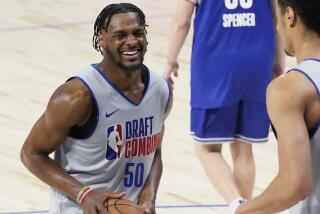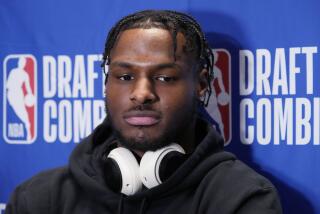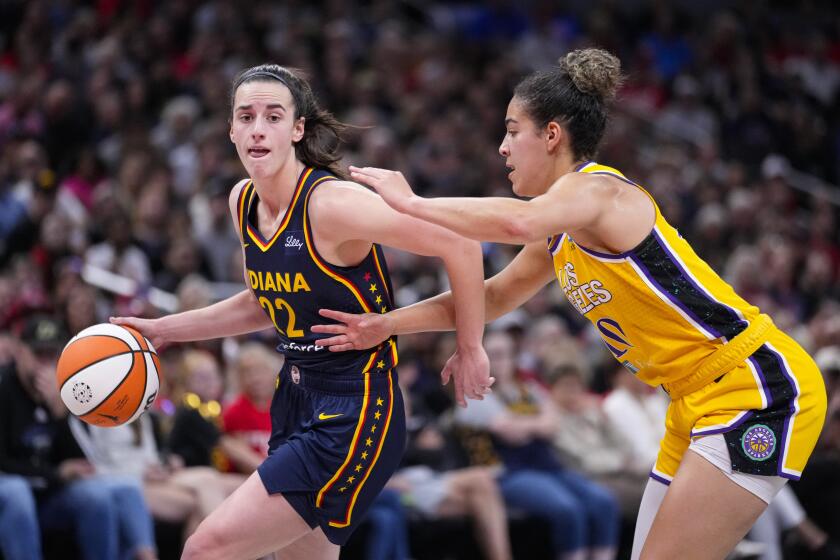‘One and done’ may be near end of its run
Brandon Jennings’ decision to bypass a one-year college commitment and instead sign a professional contract in Europe has trend-setting potential and could help end the NBA’s so-called “one-and-done” requirement for elite prep players, the leader of the NBA players’ union said Wednesday.
“I continue to be against an age limit, I’m against limiting the options these kids have,” union executive director Billy Hunter said. “It’s going to be a very big issue the next time we negotiate. . . . I’m strident in my position to eliminate the age limit.”
The NBA’s current collective bargaining agreement with the union expires after the 2010-11 season.
Hunter said the 2005 approval of a rule that players need to be 19 and a year removed from high school graduation to be drafted came about because it was “the only sticking point to close the deal,” and was inserted at the “insistence” of NBA Commissioner David Stern.
In two seasons of “one-and-done” college classes, players such as Greg Oden, Kevin Durant, Derrick Rose, Michael Beasley, O.J. Mayo and Kevin Love have been NBA draft lottery picks after one year of NCAA ball.
“It’s a questionable and suspect rule . . . you now have the NBA and NCAA partnering . . . and those [opinions] about going to college being more important than being able to earn an income are neanderthal,” Hunter said. “The [NBA] owners get the benefit of the kids’ college celebrity without having to pay them a year.”
The collective-bargaining argument over “one and done” is poised to be intense. While Hunter decries the league for delaying lottery-pick money of as much as $4.2 million to a top pick, Stern has said this year he favors extending the age limit to 20.
“The idea behind it was to give our teams a better opportunity to judge talent,” NBA spokesman Tim Frank said. “Our draft picks -- in only two rounds -- are tremendous assets. If this [rule] is better for the NCAA, that’s fine. But for us to make million-dollar decisions on kids who’ve only played against high school kids, we wanted to see a little more.”
Jennings, 18, a Southern Californian who played at Compton Dominguez High before moving to Oak Hill Academy in Virginia for his last two prep seasons, was a McDonald’s All-American ranked by many as the nation’s top high school point guard.
Jennings had signed to attend Arizona, and was awaiting an SAT score later this week that would determine if he would be eligible to play in college when he announced Tuesday he would play in a European professional league. An Arizona spokesman said Wednesday that university compliance officers have not yet received Jennings’ test score.
In a prepared written statement, NCAA President Myles Brand said, “The most important point to be made about the NBA rule, which the NCAA had no role in making, is not where high school basketball athletes decide to play, but that they can’t ignore their high school academic work and expect to play college ball.”
Longtime former shoe company representative Sonny Vaccaro, who is serving as an advisor to Jennings and his mother, Alice Knox, in the transition to Europe, said Jennings was expected to retain a Europe-based agent shortly and probably would select a team by next month.
Vaccaro described Jennings’ unprecedented European choice as “landmark.”
“Brandon Jennings is doing something unpopular for the betterment of the masses, and I believe Congress will pay attention to this and see the foolishness of the ‘one-and-done’ rule,” Vaccaro said. “This will start a chain of events that will lead to the rule’s demise. This year and next, others will follow Brandon Jennings’ decision.”
Jennings will be a free agent in Europe, and he’s open to playing in leagues based in Russia, Israel, Spain or Italy, Vaccaro said. The European season begins in September, and Jennings’ mother will live with him overseas, Vaccaro said. At this point, Vaccaro said, no team has an inside track to landing Jennings.
“We’ll be sifting through offers to give Brandon a chance to maximize himself,” Vaccaro said. “He’ll do quite well.
“This kid from Compton with a single mother just made life easier for everyone else. This is courage, to stand up and say no to the system and say, ‘I have a right to earn a living.’ ”
--
More to Read
Go beyond the scoreboard
Get the latest on L.A.'s teams in the daily Sports Report newsletter.
You may occasionally receive promotional content from the Los Angeles Times.











